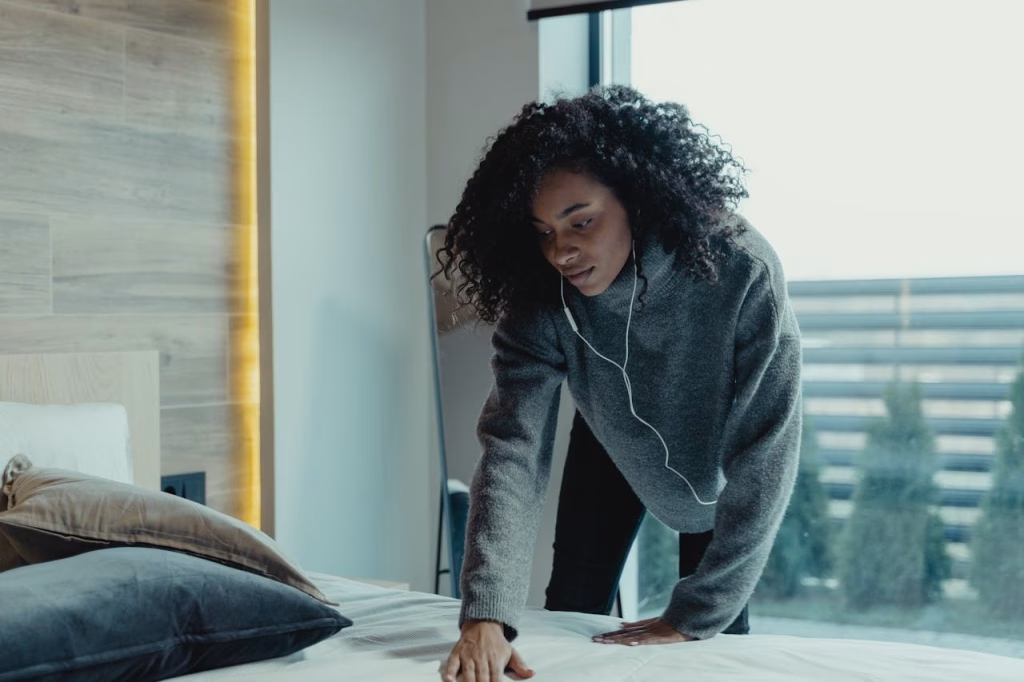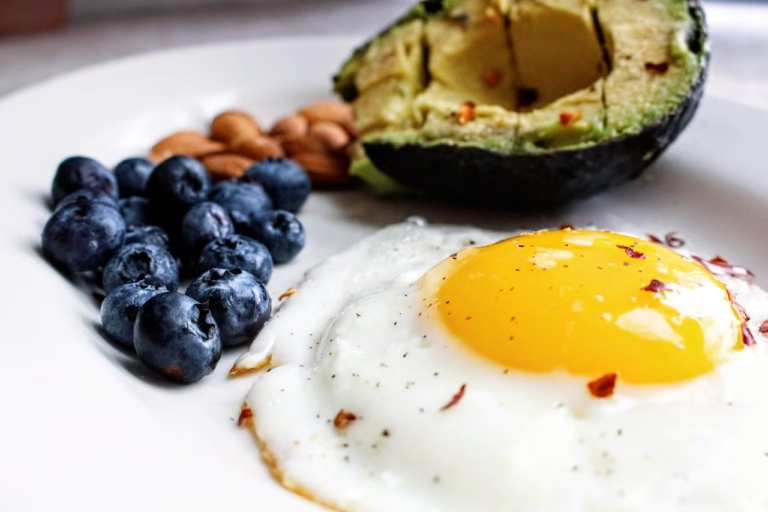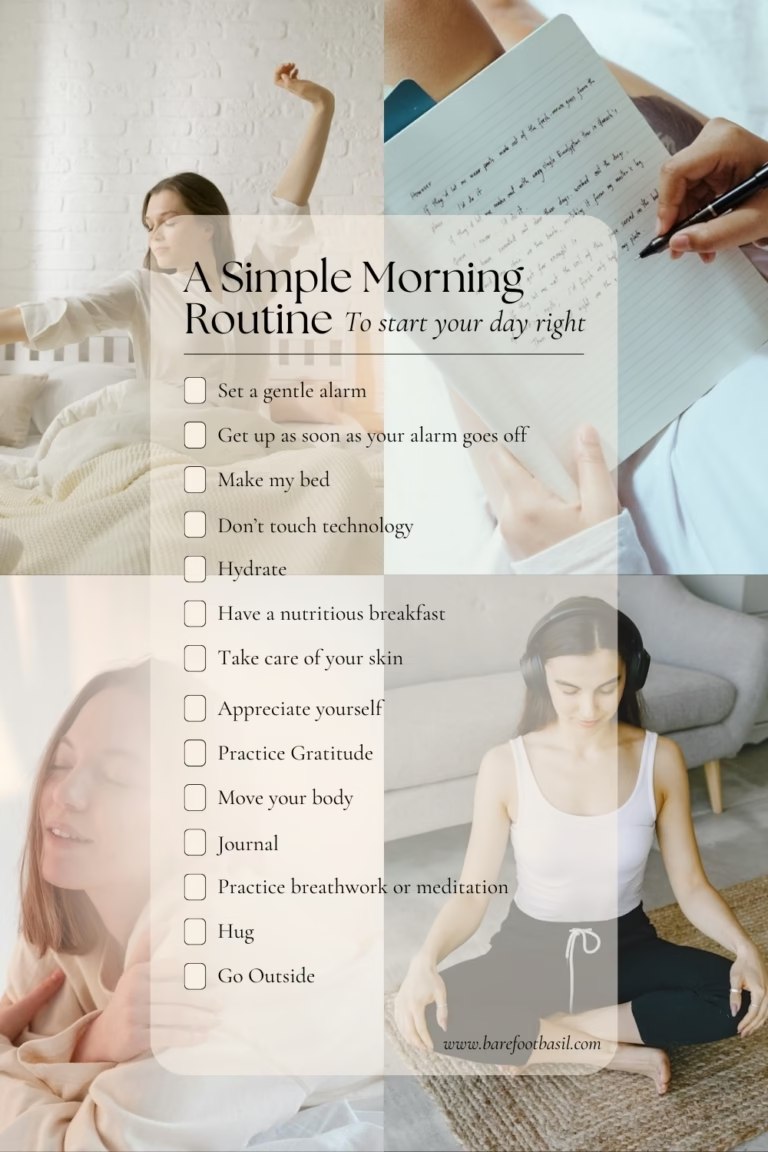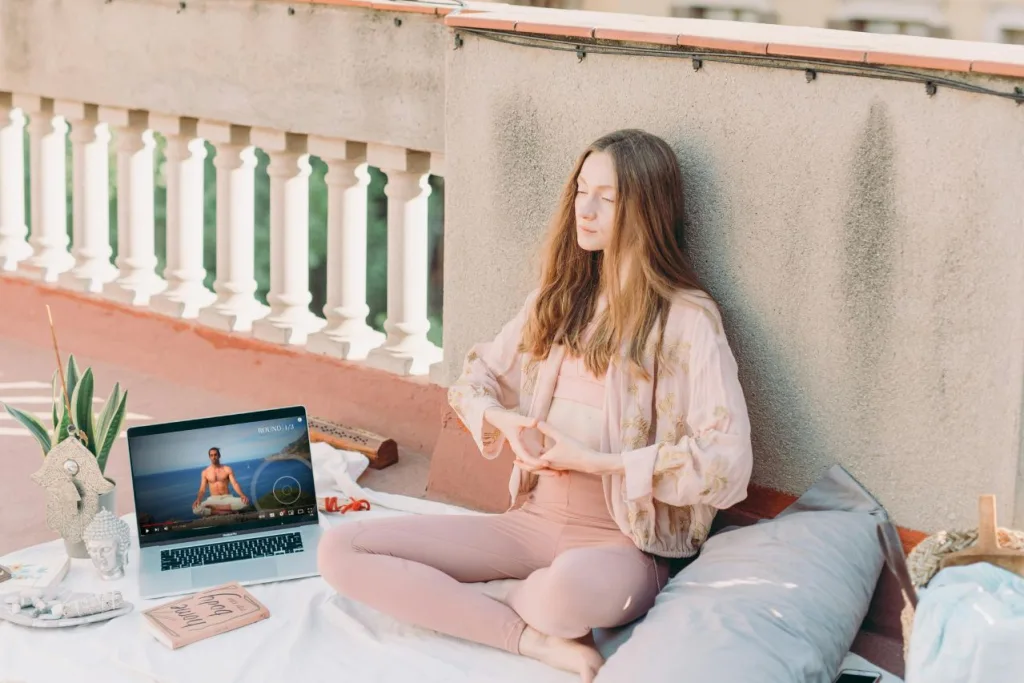I have a good morning routine that sets me up for the day, but when I start feeling overwhelmed and anxious, I love to take it easy and calm my nervous system with my calming morning routine.
Of course, with many responsibilities and family needs, your mind will not be able to do it daily, but try to have at least one morning a week that resets your nervous system and helps you ease anxiety and relax a bit more.
Starting your day right will affect your mood, productivity, and health, so it is important to put a bit of effort into it.
Here Is A Simple Morning Routine:
1. Set a gentle alarm
I used to wake up to the classic iPhone alarm clock “radar” sound so loud and aggressive that I would get out of bed stressed. I needed it when I was so exhausted from overworking that a forceful alarm clock was the only option to get me out of bed. I refused to change it for years, but now I like to wake up peacefully and calmly.
Calm melodies like Harp, Ripples, Silk, Slow Rise, and Uplift help you start your day much more relaxed. You can also set your favorite song as an alarm to start the day right.
2. Get up as soon as your alarm goes off
It might feel contradictory, but cortisol levels are highest in the morning. Instead of staying in bed, overthinking, and raising your cortisol levels even further, slowly get out. Don’t press your snooze button; gently get up instead.
If I sleep in, I feel that I am behind as soon as my day starts.
It might be quite hard to do it if you work from home or for yourself. My tip is to leave your phone in another room or where it is hard to reach from bed. As soon as you get out of bed to press”stop” on your alarm, it will be much easier not to go back to bed.
3. Make your bed
It sounds simple, but making your bed sets a tone of order and calm for the day. When your environment is tidy, your head is neat, and you are calmer and more relaxed. This will set up more structure for the rest of your day and life.

4. Don’t touch technology
So many of us start the morning by checking the news or Instagram while still in bed. To keep you in a calm frame of mind and free your head from other people’s lives, world problems, and general information overload, stay away from your phone, at least for the first few hours of the day. Let your brain wake up slowly and calmly without overloading it with information.
5. Hydrate
Don’t start the day with coffee to wake up. But it might dehydrate our body even more, and the hit of caffeine can give us nervous jitters and anxiety. Instead, start your day with a glass of filtered water. Drink lemon or coconut water full of natural electrolytes to nourish your body even more.
I always follow the rule “hydrate before caffenate”.
Most mornings, I need coffee, but if I want to start my day slowly and calmly on the weekend, I have matcha, cacao, or chai late to start my day. All these drinks have less caffeine than coffee, which is released way slower and will give you the energy you need without the sharp buzz. Herbal teas like chamomile and peppermint have calming effects.
Many studies prove that proper hydration can improve your energy levels, cognitive function, and mood.(1)(2)

6. Have a nutritious breakfast that is low in sugar
Studies show that morning cortisol levels are correlated with anxiety severity in women. (3)
Have nutritious food half an hour after waking to reduce your cortisol levels. If you are not hungry in the morning, you don’t have to have a full-on breakfast. Have something light but nutritious.
Certain foods can help reduce cortisol levels by promoting relaxation, stabilizing blood sugar, and supporting overall health. These include vitamin C-rich foods like oranges and peppers, magnesium-rich foods like leafy greens, nuts, and avocados, and omega-3 sources like flax seeds and walnuts. Whole grains, dark chocolate, and foods high in tryptophan (seeds, nuts, legumes, vegetables) can also help regulate cortisol. Probiotic-rich foods like yogurt and sauerkraut improve gut health. Antioxidant-rich foods, such as berries and turmeric, fight oxidative stress.
Avoid highly processed foods and simple carbs in the morning, as they will make you sleepy and hungry troughout the day.
7. Take care of your skin
Have a warm shower and spend more time on things you usually don’t have time for, like exfoliating or dry brushing your skin. As a nourishing serum and moisturizer, use Gua Sha for 5 to 10 minutes to make your skin more glowy and eliminate puffiness. Or do a few minutes of face yoga while I am in the shower. Self-love does miracles for our nervous system.
And don’t forget to add your sunscreen before you go outside ( yes, even in the winter).
8. Appreciate yourself
After a self-care routine, don’t forget to look in the mirror, admire your skin and body, and be kind to yourself. You can smile or even high-five yourself to start the day positively.
Mel Robbins even wrote a book about how high-fiving yourself in the morning can make a massive difference to your day and life.
If you start the day with self-love, it will be easier to keep it throughout the day.
9. Practice Gratitude
Some people like to practice gratitude at night, but thinking of a few things you are grateful for creates a positive vibe for a day. You might do it while having a hot drink, walking, or doing a self-care routine.
A simple way to start is by writing down three things you’re grateful for daily. It could be as small as enjoying tea or appreciating a good friend.
If you want to learn more about the benefits of gratitude practice, read Why Gratitude Works: The Benefits and How to Practice It Daily
10. Move your body
Have a gentle stretch or dance to get your body feeling relaxed and less stiff. You can play your favorite music that keeps you calm and happy; I love listening to Ram Dass to set me up for the day. You can also practice gentle yoga on YouTube, or follow this gentle 10-minute mindful movement sequence to connect and check-in.
"Exercise can improve mood states, reduce anxiety, and enhance self-esteem, making it a viable means of treating depression and anxiety."(6)
This part is especially important if you work on your computer and spend most of your day sitting.(7)
If you are not a big fan of yoga, you can also do a quick walk outside with a few stretches.
11. Journal
It is excellent to get rid of the thoughts from our head to something physical to keep our head calm. Ideally, you should journal in a notebook, but you can also do it on your phone. Don’t overthink it; write what comes to your mind first. If you are stuck, write letters to your past or future self, your best friend or enemy, or someone you admire or want to be like.
If you have a busy day ahead, also spend some time doing your to-do list so it is not in your head, but on paper.
12. Practice breathwork or meditation
Some days, I love to meditate, but some days, I like to breathe. Both practices are equally beneficial and will calm you down, and will start the day in a calm and focused mode.
If you don’t know where to start, you can find fantastic breathwork and meditation practices on YouTube.
I also cover breathwork techniques and benefits in more detail HERE.
13. Hug
Hugs are a simple yet powerful way to feel calm, appreciated, and loved. We have a 12 hugs-a-day rule in our household; I can’t remember where I have heard this theory that we need four hugs a day to survive and 12 to be optimal ( I will try to find science on this one, even if it is not valid, it cannot harm for sure).
If you live by yourself, hug your pet, or even a tree on your walk, or even yourself, you will start feeling the change in your mood.
14. Go Outside
Ideally, you want to walk in green spaces near nature, trees, grass, and water. Stay present by focusing on nature’s sounds, birdsong, rustling leaves, or running water. Choose gentle instrumental music if you’re in a noisy urban area. Try to listen to the sounds of nature – are there any birds singing, trees swinging in the wind, or rivers flowing by?

If I feel a bit anxious and flustered, I like to go for a run- it gets rid of my stressful energy and gives me a lot of clarity. My best idea comes when I go for a run or a walk in nature.
There have been many studies suggesting that sunlight exposure positively impacts psychological well-being by reducing depression, anxiety, and stress and enhancing overall mental health. (4)(5)
If you are short on time, at least go to your balcony or come close to your window and have your morning coffee with natural sunlight.
Here is a simple morning routine checklist you can print out or save as your phone screensaver:

To summarise A Simple and Science-Backed Morning Routine
I hope you found this calming morning routine helpful, even if it is simple. The key is not to overcomplicate things; breathe and relax. You may not feel like doing this every day, so try to add one or two things from this list and see what helps you the most to relax and stay calm. We are all unique, and various protocols work differently for each of us.
What small step can you take tomorrow to make your morning more peaceful?
Please Note: This post is for informational purposes only and is based on research. It’s not medical advice. It’s always best to consult a healthcare professional with health concerns. Enjoy your calming morning routine.
Study References
- Zhang, J., , G., Du, S., Liu, S., & Zhang, N. (2021). Effects of Water Restriction and Supplementation on Cognitive Performances and Mood among Young Adults in Baoding, China: A Randomized Controlled Trial (RCT). Nutrients, 13. https://doi.org/10.3390/nu13103645.
- Young, H., Cousins, A., Johnston, S., Fletcher, J., & Benton, D. (2019). Autonomic adaptations mediate the effect of hydration on brain functioning and mood: Evidence from two randomized controlled trials. Scientific Reports, 9. https://doi.org/10.1038/s41598-019-52775-5.
- Dr PallabiKonwar and K. N. Kalita. “Trait Anxiety and Salivary Cortisol Levels In Female College Students in Assam.” (2020).
- Wang, J., Wei, Z., Yao, N., Li, C., & Sun, L. (2023). Association Between Sunlight Exposure and Mental Health: Evidence from a Special Population Without Sunlight in Work. Risk Management and Healthcare Policy, 16, 1049 – 1057. https://doi.org/10.2147/RMHP.S420018.
- Taniguchi, K., Takano, M., Tobari, Y., Hayano, M., Nakajima, S., Mimura, M., Tsubota, K., & Noda, Y. (2022). Influence of External Natural Environment Including Sunshine Exposure on Public Mental Health: A Systematic Review. Psychiatry International. https://doi.org/10.3390/psychiatryint3010008.
- K. Fox. “The influence of physical activity on mental well-being.” Public Health Nutrition, 2 (1999): 411 – 418. https://doi.org/10.1017/S1368980099000567.
- Wheeler, M., Dunstan, D., Smith, B., Smith, K., Scheer, A., Lewis, J., Naylor, L., Heinonen, I., Ellis, K., Cerin, E., Ainslie, P., & Green, D. (2019). Morning exercise mitigates the impact of prolonged sitting on cerebral blood flow in older adults.. Journal of applied physiology, 126 4, 1049-1055 . https://doi.org/10.1152/japplphysiol.00001.2019.
Silvija Meilunaite, PN1-NC, CSMC, is a certified nutrition and menopause coaching specialist who writes about midlife health, nutrition, and evidence-based wellness. She focuses on research-driven approaches to feeling better in your 40s and beyond, with a special interest in low-tox living and supportive daily habits.





